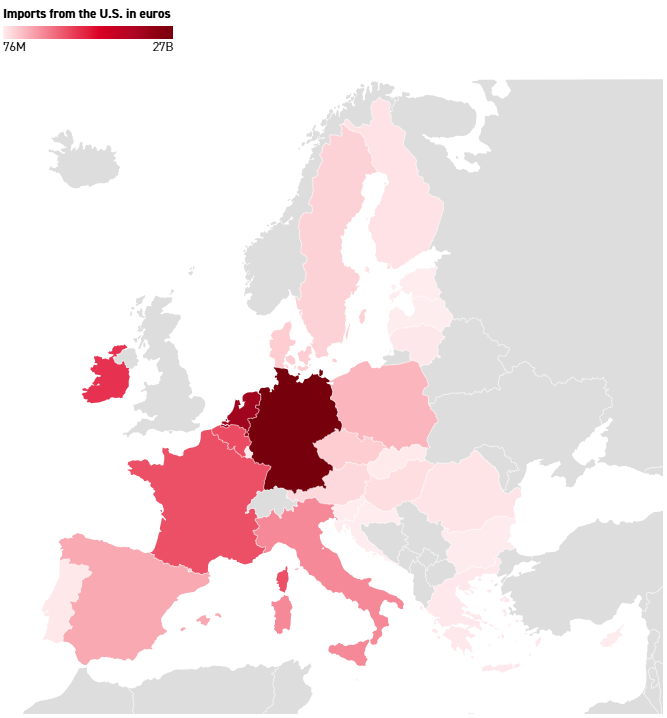The EU proposes countermeasures to Trump duties of almost 100 billion euros – which products are included in the list – Brussels plan to appeal to WTO
Some of Europe’s largest economies, Germany, the Netherlands and Belgium are expected to pay the highest price in the US trade war as they are at the forefront of new European countermeasures, targeting imports of almost 100 billion euros in response to Trump’s duties.
In one move aimed at increasing pressure on negotiations with US President Donald Trump, the European Commission proposed a fifth countermeasures worth almost 100 billion euros in imports, including large categories of goods such as aircraft.
Passenger cars, medical devices, chemicals, plastics and many agricultural products are targeted. The list came in again Berbon Along with other alcoholic beverages, although they had been removed in the past after pressure from France and Italy, two countries that produce wine and feared Trump’s reaction.
The above is included in a 200 -page list of more than 4,800 products, compiled by EU officials in response to the imposition of Trump’s “reciprocal” duties last month, as well as tariffs on European cars. According to Eurostat, EU imports for these species exceeded 109 billion euros in 2024, with aircraft being the largest category, with over € 13 billion, and cars following 7 billion euros.
The EU is also considering limiting the exports of steel scrap and chemical products worth € 4.4 billion.
At the same time, Brussels are planning to file an appeal to the World Trade Organization (WTO) against the imposition of so -called “reciprocal duties” by Trump, as well as against duties on cars and spare parts. It is not yet clear when exactly this process will officially begin.
The real goal remains to “reach a trade agreement with the US”, said European Commission President Ursula von der Layen. “At the same time, we continue to prepare for all possible and the consultation that begins today will guide us on this project necessary.”
No return
The European Commission is proceeding with the new lists because it has now realized that there is no return to the previous status quo in its relations with Washington, as Politico notes.
Trump imposed on Europe on April 2, a “reciprocal” duties of 20% on most goods, before it reduced them a week later to 10%, a percentage that had already imposed on most countries, as stock markets and bond markets panicked from the impact on US growth.
However, the European Commission expects that the Trump government will show greater flexibility in reducing the basic duty of 10%, while duties on cars, steel and aluminum are likely to be maintained as they are linked to Washington’s strategic goal of “rehearsal”.
“If we do not fall below 10%, there is no negotiation, there is no agreement,” the official added.
The countries that are expected to be more affected are Germany, the Netherlands and Belgium, while Greece belongs to the countries with a low volume of imports from the US (according to the color mark, below 1 billion euros). In particular, Greece introduced US products worth € 389 million in 2024, which may be targeted by new EU import duties.
In 2024, Germany was the first to import US products in the European Union, with a total value of 27 billion euros, followed by the Netherlands with 22.3 billion euros. Belgium was in third with 10.4 billion euros, marginally exceeding France, which introduced goods worth 10.1 billion euros. Italy fills in the five with imports of 6.4 billion euros, while Spain follows at 4.4 billion euros.
The list of products that may be targeted by European countermeasures remains under forming, as EU businesses and Member States have a deadline until June 10 to express their views and request the removal of sensitive products in order to avoid retaliation by Trump.
This had also happened in April, when the Commission had called for the European capitals on countermeasures on Trump’s previous steel and aluminum duties with a typical example being Burbon’s removal from the list, at the request of France, Italy and Ireland. Eventually, these measures were announced but were not implemented, as Trump temporarily suspended the reciprocal duties.
The endangered European duties on the aircraft would be a strong blow to Boeing, the troubled American giant in the air sector, and could rekindle a long -term transatlantic controversy over subsidies, which had been diverged after Trump’s first term.
“Boeing is welcome to answer,” the senior official added, speaking under anonymity.
The total value of the products in the list is, however, much smaller than the EUR 379 billion of EU exports affected by US duties. A second senior committee official said that Brussels showed self -restraint: “We do not want to shoot our feet. We want to be prudent “, in order to avoid an escalating logic of retaliation that” would hurt our own industry “.
This list is added to the already existing EU tactical retaliation, after several high -level contacts between Brussels and Washington who have failed to divergent the acute commercial tensions.
In addition to the 10% duty imposing on most European imports, Washington also applies an additional 25% duties on cars, steel and aluminum.
The Trump government is exploring additional areas for additional areas such as medicinal products, trucks, timber and semiconductors. Unless a transatlantic agreement is reached, the highest “reciprocal” duty of 20% is expected to come back from the beginning of July.
Source: Skai
I am Janice Wiggins, and I am an author at News Bulletin 247, and I mostly cover economy news. I have a lot of experience in this field, and I know how to get the information that people need. I am a very reliable source, and I always make sure that my readers can trust me.











